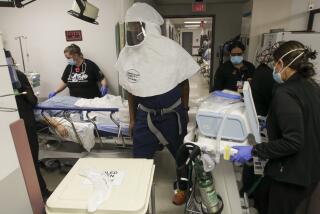Health Workers Given AIDS Guidelines
- Share via
ATLANTA — Federal health officials issued new AIDS protection guidelines for health care workers Thursday, warning that all patients should be treated as potentially infected.
In an 18-page guide for doctors, nurses and other medical personnel, the national Centers for Disease Control said appropriate precautions, such as use of gloves, masks and goggles, should be taken any time “contact with blood or other body fluids of any patient is anticipated.”
“The increasing prevalence of HIV (AIDS virus) increases the risk that health care workers will be exposed to blood from patients infected with HIV,” the CDC said.
Goes Beyond Routine
Dr. Harold Jaffe, an AIDS specialist with the Atlanta-based CDC, said the agency is “certainly not recommending (such) precautions for . . . (every) routine patient contact.”
“The minimum level of infection control precaution should be to assume that any patient might potentially be infected, and health care workers should follow precautions appropriate to protect them,” he said.
CDC officials have for years urged doctors and other health workers to guard against contact with the blood or body fluids of people who might be infected with the virus that causes AIDS. The virus is transmitted most often during sex or drug needle use, but it can enter another person’s system through cuts or breaks in the skin.
Twelve health care workers not otherwise considered at risk for AIDS have been reported to be infected with the AIDS virus. U.S. health officials know of none of them who have actually developed the deadly disease.
Mouthpieces Recommended
The AIDS virus has been found in saliva also, and the CDC recommends protective mouthpieces for mouth-to-mouth resuscitation, although saliva has not been implicated in any cases of AIDS transmission.
The new guidelines break little new ground in recommending certain techniques for certain types of patients. Rather, Jaffe said, they emphasize “universal” precautions against exposure to blood and bodily fluids.
The CDC guidelines touch also on what Jaffe termed “very controversial areas”--whether patients and health care workers should routinely be tested for the AIDS virus.
Last week, in its official AIDS testing recommendations, and again in Thursday’s report, the CDC said it does not recommend widespread testing for patients or medical personnel.
More to Read
Sign up for Essential California
The most important California stories and recommendations in your inbox every morning.
You may occasionally receive promotional content from the Los Angeles Times.













